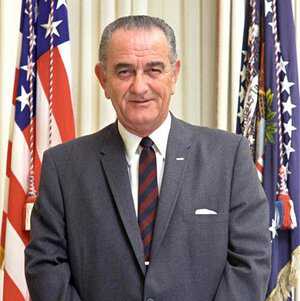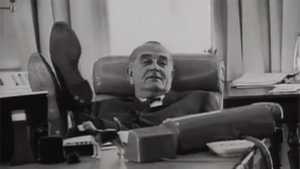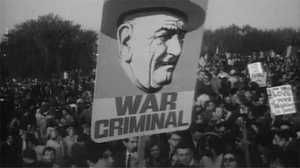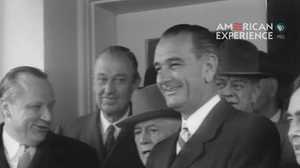36th President

Terms: 1963-1969
Political Party: Democrat
First Lady: Claudia (Lady Bird) Taylor Johnson
Vice President: Hubert H. Humphrey
Overview
Born: August 27, 1908, in Stonewall, Texas... Lyndon Johnson was the first president to appoint an African American to the Supreme Court. On June 13, 1967, Johnson named Thurgood Marshall, the great-grandson of a slave, to sit on the highest court in the land...Visions of a Great Society swallowed up in the quagmire of Vietnam — Lyndon Johnson exploited his mastery of the legislative process to shepherd a collection of progressive programs, rivaling those of FDR’s New Deal, through Congress with astounding success. An unpopular and costly war, however, eroded his political base and left him an exile within his own White House... Died: January 22, 1973.
The Era
1964: Passage of Civil Rights Act
1964: Warren Commission issues report on Kennedy assassination
1964: PLO formed
1965: Cesar Chavez organizes farm workers
1966: National Organization for Women is formed
1966: Indira Gandhi becomes prime minister of India
1967: Israel wins Six-Day War
1968: Shirley Chisholm becomes first black woman elected to Congress
1968: Rev. Dr. Martin Luther King, Jr. and Robert F. Kennedy assassinated
Domestic Politics
On November 22, 1963, President John F. Kennedy was shot and killed by an assassin while riding through the streets of Dallas, Texas in an open motorcade. A little more than two hours later Lyndon Johnson recited the presidential oath of office aboard Air Force One. Johnson had arrived at the pinnacle of his political career under the worst possible circumstances. Lyndon Johnson wasted little time in distinguishing himself as a skillful leader who would transform Kennedy's vision into a reality. To Johnson, the essence of leadership lay in building consensus among diverse groups. He opened his White House to mayors, businessmen, union leaders, congressmen, and academics. He directed dozens of task forces to design programs that embodied his vision of a benevolent government that cared for the poorest and most helpless of its citizens.
Foreign Affairs
April 7, 1965, President Lyndon Johnson delivered his first major speech on the war in Vietnam. Opposition to the war had been growing as a result of Operation Rolling Thunder, an expanded U.S. bombing campaign against the North Vietnamese that began the previous month. LBJ ordered his staff to compose an address that would appease his detractors. In the speech Johnson, attempted to do what he had done so successfully throughout his long and colorful political career — make a deal. Lyndon Johnson did not initiate American involvement in Vietnam. Truman, Eisenhower, and Kennedy laid the groundwork for U.S. intervention. But the Vietnam War would come to be seen as Johnson's war. It would dominate not only his entire foreign policy, but overshadow his ambitious domestic programs.
Presidential Politics
In July 1964, the Republican party nominated Senator Barry Goldwater as the candidate to unseat President Lyndon Johnson. The ultra-conservative Arizona senator, whose radical right-wing rantings alienated scores of voters, never had a chance. Polls indicated that Lyndon Johnson would retain the White House by a large margin. Despite the optimism of polls and pundits, Lyndon Johnson appeared unsure about his suitability for the office of the presidency. For months he had expressed to trusted friends and aides his feelings of anxiety about the legitimacy of his presidency. People close to Johnson spoke of how he often voiced grave doubts about his effectiveness and reputation, only to bask in delight as others reassured him of his political brilliance. In her journals, Lady Bird Johnson referred to this pattern of behavior as "the same old refrain." Still, as the summer of 1964 approached, there was much uncertainty as to Johnson's plans for the future.







